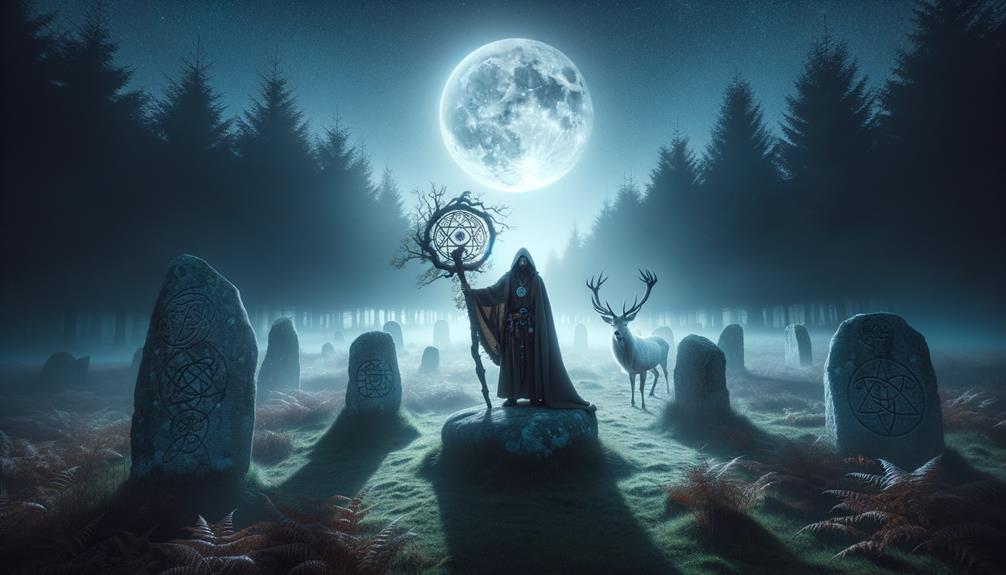Back in the day, in the lush greenery of ancient Celtic territories where the rustle of the wind met the rhythmic pulse of the earth, a fascinating and respected group called the Druids had significant influence. As a researcher, I find this cryptic group quite captivating. Even though they held essential roles as priests, teachers, and judges in Celtic society, they never left any written records. Their faith in the eternal soul, their sacred rites, and their deep relationship with nature all sketch an exciting image, though many details remain unknown. The Roman rule further hid their history, as it led to their suppression. But as we slowly unmask the past, the lasting curiosity about the Druids provides us with exciting peeks into their world, encouraging us to learn more.
Understanding Druids' Origins

Consider the roots of the Druids. It's quite interesting that the name 'Druid' might come from a Celtic word that means 'knower of the oak tree'. This suggests a deep bond with nature, which is a key part of Druidic beliefs. This is evident in their deep respect for the natural world, especially the oak tree, which was considered sacred in ancient Celtic cultures.
We first hear about the Druids from records dating back to the 3rd century BCE, showing that they have a long-standing place in history. These early Druids held significant positions in their communities. They weren't just priests, they were also teachers, judges, and philosophers. But when Ireland adopted Christianity, the Druids' influence started to wane and their roles in society changed. However, Druidic tradition didn't completely disappear.
Nowadays, many people are still interested in Druidic practices, which often involve worshipping nature, performing rituals, and studying ancient Celtic customs. This renewed interest shows a desire to reconnect with the past and appreciate the wisdom of the Celtic Druids. The story of the Druids is a fascinating trip into a time when nature and knowledge were deeply connected.
Druids' Role in Celtic Society
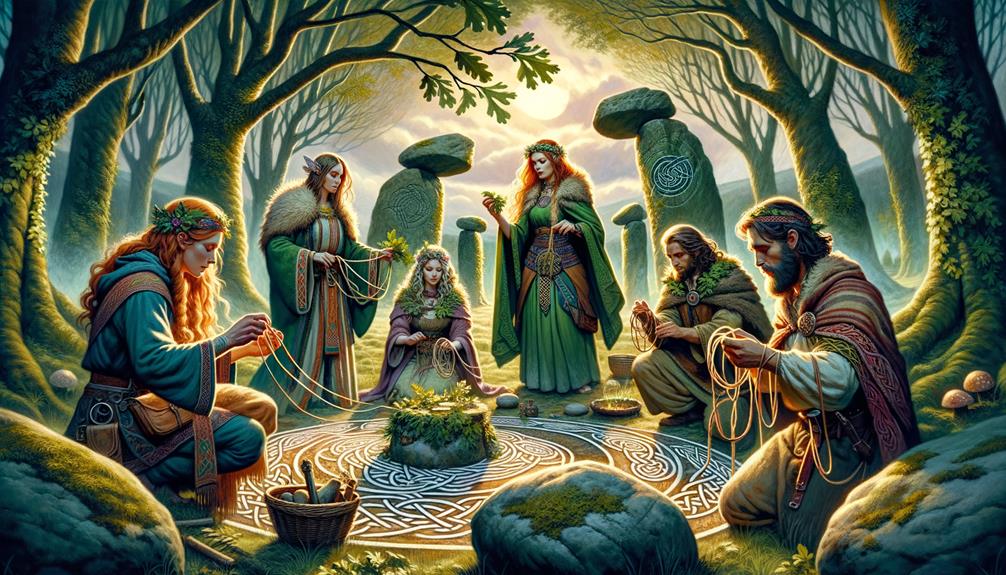
Druids and their place in Celtic Society
Looking back at the history, Druids had a pretty substantial role in Celtic society. They were more than just members; they were key figures, taking on multiple roles like priests, teachers, and judges.
As priests, they had some pretty important duties. They would carry out public and private sacrifices, often to show respect to the Celtic Gods. Plus, they were the guardians of the Celtic religion, a core aspect of Celtic culture.
And let's not forget their roles as teachers and judges. They taught young men, sharing the wisdom of the Druids and making sure it remained a vital part of Celtic culture. As judges, they would resolve disagreements, and their judgments were widely accepted throughout the Celtic lands.
People saw Druids as essential go-betweens, mediating between men, women, and the gods in Celtic societies. Of course, their high standing in society took a hit with the Roman suppression of Druids in Gaul and Britain. But even then, they didn't disappear. In fact, in Ireland, they kept on going, serving as poets, historians, and judges. And the renewed interest in Druids during the Romantic period shows just how much of a lasting impact they had on Celtic cultures.
Exploring Druidic Beliefs and Practices
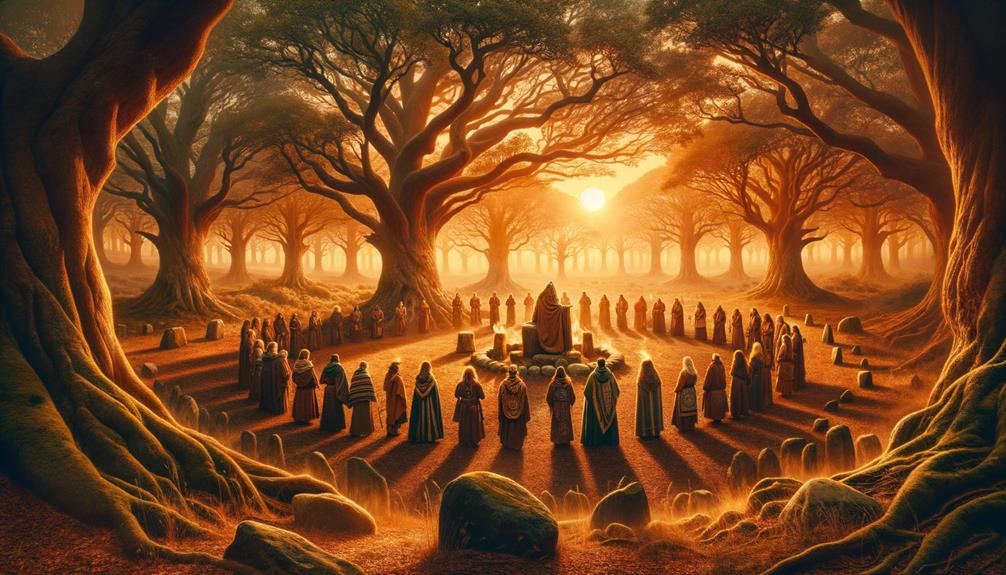
Taking a closer look into Druidic beliefs and practices, they form a deep connection with nature, rituals, human sacrifices, and the study of ancient Celtic traditions. The ancient druids, a vital part of Celtic culture, had an intense respect for nature. This was mirrored in their seasonal ceremonies, each closely tied to nature's rhythms.
Druids held the belief in the soul's immortality, which they believed would undergo a cycle of rebirth after death. This understanding added a new layer to their perception of existence, moving beyond the physical world to acknowledge the spiritual. While the idea of human sacrifice by Druids may be uncomfortable to our modern minds, it was a part of their extensive ritual framework, used to pacify deities or seek divine favor.
Sacred locations played a crucial part in Druidic practices. They were used for yearly gatherings, sacrifices, and teachings. These sites were usually natural locations like groves or springs, further highlighting the Druidic bond with nature. A study of Druidic beliefs and practices reveals an ancient and intricate system deeply tied to nature and life cycles.
Druids' Interaction With Other Civilizations
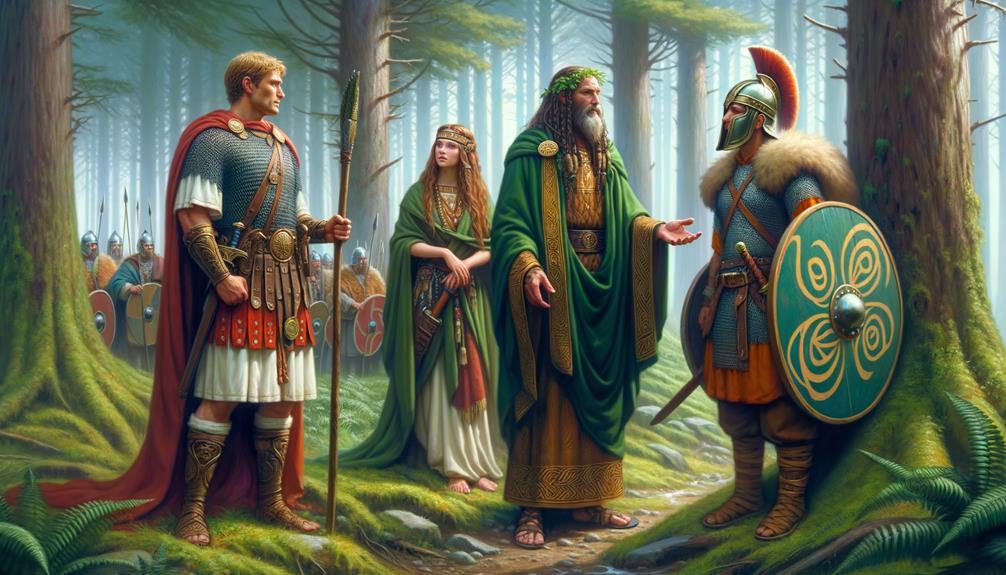
Delving into the life of the Druids in relation to other civilizations, it's evident that they were pivotal to Celtic societies. Notably, they had substantial interactions with the Romans and later inspired movements in the Romantic period. Accounts from Roman authors, such as Julius Caesar, provide us with insights into the Druids' dealings with civilizations, especially the Romans and Greeks.
When it came to living under Roman rule, the Druids' status underwent a transformation:
- In the beginning, the Roman army held the Druids in high regard, owing to their influence and knowledge.
- However, as the Roman Empire grew and their culture assimilation strategies began to take root, Druidism seemed to vanish. The Romans suppressed the Druids, which led to their downfall.
The era after the Romans and the advent of Christianity also had a profound impact on the Druids:
- In Ireland, Druids showed resilience, forging ahead as poets, historians, and judges.
- In other places, the rise of Christianity led to the near extinction of Druidism.
Despite these setbacks, the Romantic period witnessed a renewed interest in Druids. Presently, the Druids are an important area of study, their role and interaction with other civilizations providing a captivating aspect of ancient history.
Modern Druidism and Celtic Heritage
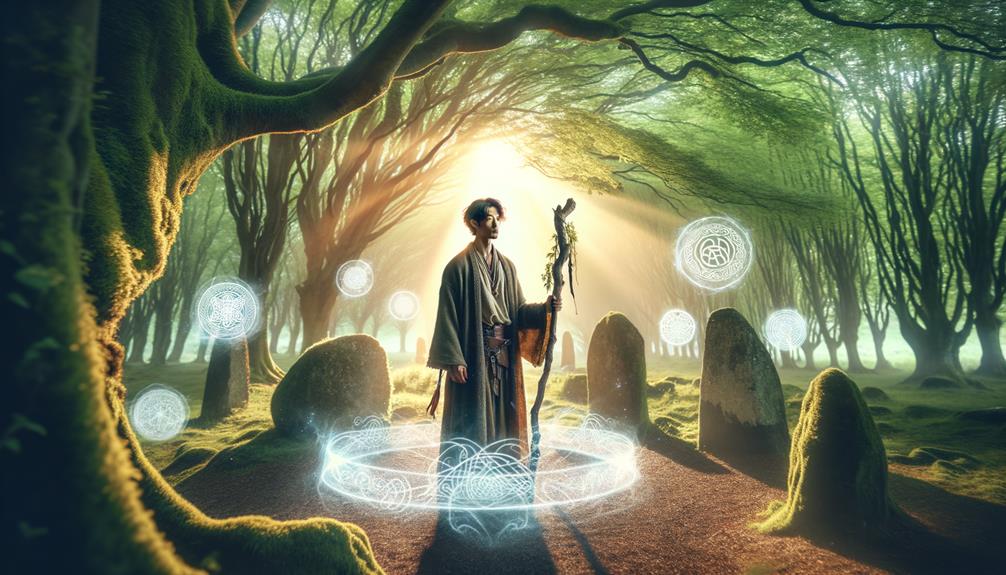
It's quite a sight to see how modern Druidism has risen from the ashes. This spiritual movement aims to breathe new life into the old Celtic religious practices and beliefs. The emphasis of today's Druidry is on worshipping nature, performing rituals, and delving into ancient Celtic traditions. Many people following this path are on a quest for a deeper connection to the source of truth, viewing the Celtic journey as a pathway to inner joy.
The resurgence of Druidry is an intriguing part of Druid history. This fresh interest in Druidism has its roots in a simplified form of Cabbalism, with a focus on nature, symbolism, and living in tune with the natural world.
| Druid Revival | Ancient Law | Oral Tradition |
|---|---|---|
| Modern Druidism came before Roman Druidism, Wicca, and Cabbalism | Druid priests in the British Isles were the upholders of ancient law | Stone circles, integral to the oral tradition, play a key role in Druidry |
Without a doubt, modern Druidism provides a fresh lens to view Celtic Druid heritage and spirituality. It allows us to delve deeper into the Celtic and Gaulish cultures. It takes us on a journey back to a time when the threads of nature, tradition, and spirituality were intricately woven together.
Frequently Asked Questions
What Is the Difference Between the Celts and the Druids?
So, you're curious about the difference between Celts and Druids, right? Well, think of it this way. The Celts are a vast ethnic group sort of like a big family, while the Druids? They're a specific bunch within that family. They're like the family's teachers, priests, and judges. They've got specialized roles within the larger Celtic society. It's a bit like how a family might have aunts and uncles who are teachers or lawyers. That's the simplest way to understand the difference between the two.
Do Celtic Druids Still Exist?
Absolutely, there are people today who identify as Celtic Druids. However, it's crucial to note that this modern interpretation isn't a carbon copy of the old traditions. Our understanding of the original Druids is limited due to the lack of historical records. Despite this, today's Druids share a common thread with their ancestors – a deep respect for nature and an appreciation for ritual.
What Are the Main Beliefs of Druids?
As a Druid, my faith is grounded in some key principles. I hold dear the notion of the soul's everlasting existence, the profound respect for nature, especially oak trees, and the strength of divination. Part of my role is to mediate conflicts, and yes, even evoke madness if the situation calls for it.
Who Came First Celts or Druids?
You might be wondering, who was first – the Celts or the Druids? Well, it's a bit of a puzzle. Judging by their deep respect for nature and their spiritual practices, it seems the Druids might have been around before the Celts. But, don't take this as gospel. There's no solid historical proof to back this up, and scholars keep going back and forth on it. So, as of now, it's still an open question.

